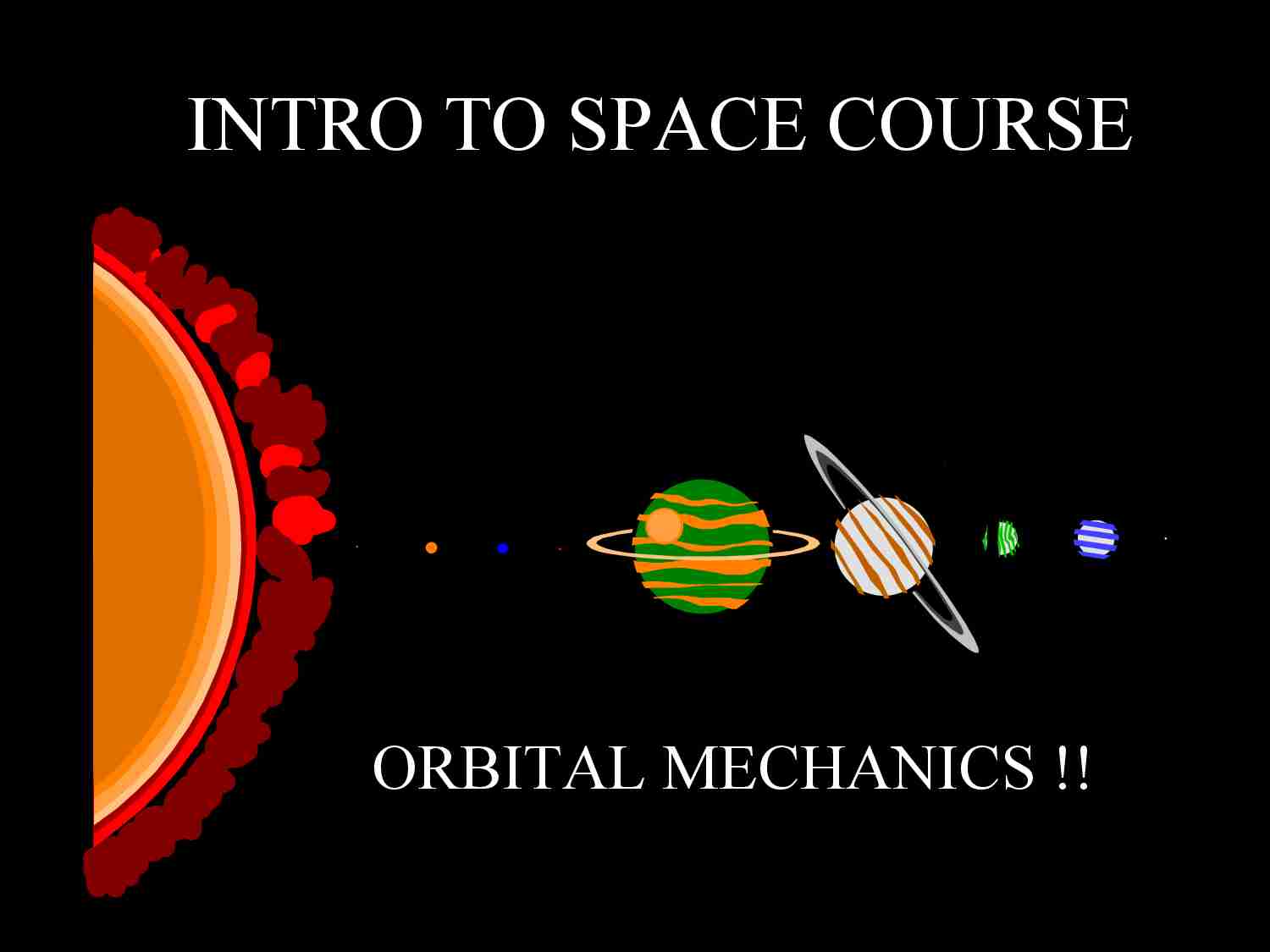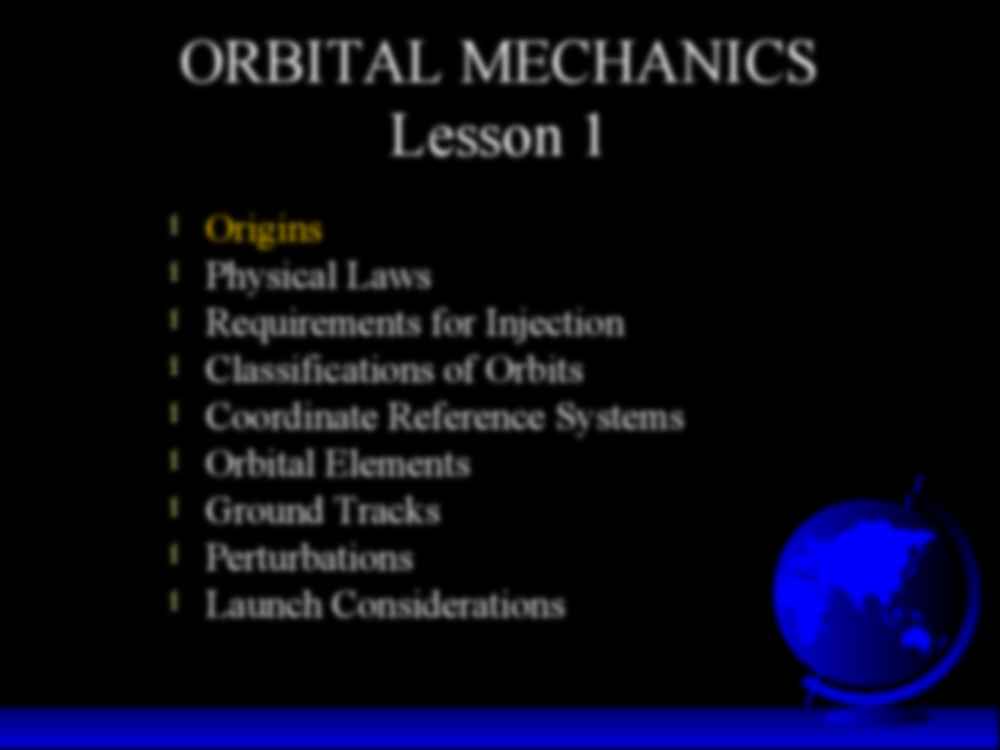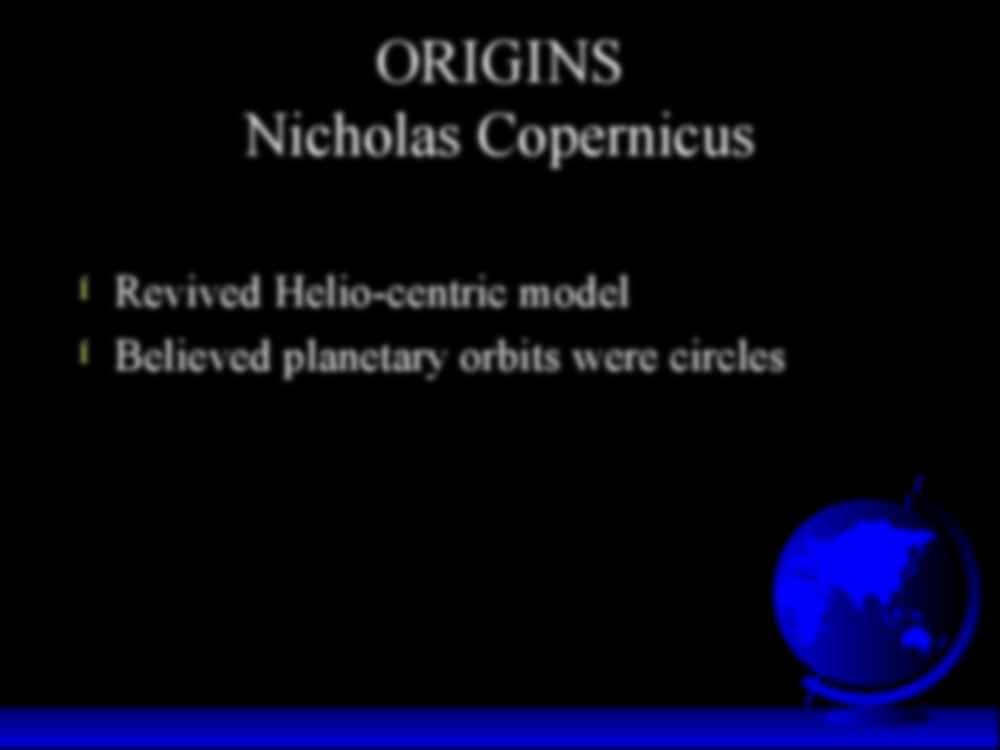To tylko jedna z 82 stron tej notatki. Zaloguj się aby zobaczyć ten dokument.
Zobacz
całą notatkę



ORBITAL MECHANICS !! INTRO TO SPACE COURSE ORBITAL MECHANICS Lesson 1 Origins Physical Laws Requirements for Injection Classifications of Orbits Coordinate Reference Systems Orbital Elements Ground Tracks Perturbations Launch Considerations ORIGINS Nicholas Copernicus Revived Helio-centric model Believed planetary orbits were circles ORIGINS Tycho Brahe Introduced precision into astronomical measurements Mentor to Johannes Kepler ORIGINS Johannes Kepler Derived 3 laws based upon his observations of planetary motion PHYSICAL LAWS Kepler’s 1st Law: Law of Ellipses The orbits of the planets are ellipses with the sun at one focus PHYSICAL LAWS Ellipses FOCI Period (T) Semi-Major Axis (a) Semi-Minor Axis (b) PHYSICAL LAWS PHYSICAL LAWS Kepler’s 2nd Law: Law of Equal Areas The line joining the planet to the center of the sun sweeps out equal areas in equal times T6 T5 T4 T3 T2 T1 A2 A3 A4 A5 A6 A1 PHYSICAL LAWS Kepler’s 2nd Law: Law of Equal Areas PHYSICAL LAWS Kepler’s 2nd Law: Law of Equal Areas t0 t3 t1 t2 Area 1 Area 2 t1-t0 = t3-t2 Area 1 = Area 2 Satellite travels at varying speeds PHYSICAL LAWS Kepler’s 3rd Law: Law of Harmonics The squares of the periods of two planets’ orbits are proportional to each other as the cubes of their semi- major axes: T12/T22 = a13/a23 In English: Orbits with the same semi- major axis will have the same period ORBITAL MECHANICS Lesson 1 Origins Physical Laws Requirements for Injection Classifications of Orbits Coordinate Reference Systems Orbital Elements Ground Tracks Perturbations Launch Considerations PHYSICAL LAWS Sir Isaac Newton Derived three laws of motion Derived the Law of Universal Gravitation Explained why Kepler’s laws worked PHYSICAL LAWS Newton’s 1st Law: Law of Inertia Every body continues in a state of uniform motion unless it is compelled to change that state by a force imposed upon it PHYSICAL LAWS Newton’s 2nd Law: Law of Momentum Change in momentum is proportional to and in the direction of the force applied Momentum equals mass x velocity Change in momentum gives: F = ma F F PHYSICAL LAWS Newton’s 3rd Law: Action - Reaction For every action, there is an equal and opposite reaction Hints at conservation of momentum
(…)
… SYSTEMS
Topocentric
Purpose: To locate a satellite with respect
to a specific point on the Earth
COORDINATE SYSTEMS
Topocentric
Elevation
COORDINATE SYSTEMS
Topocentric
Azimuth
Range
Origin: Antenna
FP: Local Horizon
PD: True North
COORDINATE SYSTEMS
Geocentric Inertial
Purpose: To determine the exact orientation of an
orbital plane and to locate points in space with
respect to the Earth
Ecliptic…
…
Characteristics
– Varying speed
– Varying altitude
– Asymmetric Ground Track
Typical Missions
– Deep space surveillance (Pioneer)
– Communications (Polar comm.)
– Ballistic Missiles
ORBIT CLASSIFICATIONS
Parabolic/Hyperbolic Trajectories
Characteristics
– Escaped Earth’s gravitational
influence
– Heliocentric
Typical Missions
– Interplanetary exploration (Galileo,
Phobos, Magellan)
ORBIT CLASSIFICATIONS…
… Earth’s surface
– Requires Latitude and Longitude
Topocentric
– Locates a satellite with respect to a site
– Requires Azimuth, Elevation, Range
COORDINATE SYSTEMS
Review
Geocentric Inertial
– Locates orbital plane with respect to the Earth
– Requires Right Ascension and Inclination
Orbit Inertial
– Locate orbit within orbital plane
– Requires Argument of Perigee
ORBITAL MECHANICS
Lesson 1…
... zobacz całą notatkę






Komentarze użytkowników (0)